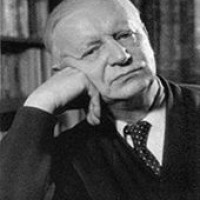Dreyer is a Danish screenwriter and director, considered to be one of the greatest directors of all time. He was born out of wedlock to a Swedish housekeeper and her master and given up for adoption. He was adopted by a strict Lutheran family and ran away from home at the age of seventeen. After several office jobs he became a journalist and wrote for different newspapers. He entered the world of film writing subtitles and screenplays and later became an editor. He made his directing debut in 1919 with the drama
Præsidenten that deals with his familiar theme – the responsibility of parents towards children born out of wedlock. Afterwards he made
Prästänkan (1920) and the story about Satan’s banishment from Eden
Blade af Satans bog (1921). At first his films were not very successful, but soon he developed his own style and by the late 1920s got the title of the best Danish director. He made the love drama
Michael (1924), family satire
Du skal ære din hustru (1925) and his most famous historical film
The Passion of Joan of Arc (La passion de Jeanne d'Arc, 1928), made in French production. This and his next film, the French-German coproduction
Vampire (Vampyr, 1932), did not have great commercial success and Dreyer returned to journalism. He directed his next feature film
Day of Wrath (Vredens dag) in 1943. It was a sound film whose stylistic characteristics (long shots and very careful compositions) Dreyer used in his next films as well. After
Två människor (1945), he directed several short and documentary films and in 1952 became the manager of the
Dagmar film theater in Copenhagen. There was a long break between his last two feature films,
Ordet (1955) and
Gertrud (1964). Even though he had a reputation as an excellent director, he was famous as a fanatic perfectionist and a tyrant on the set, had trouble finding investors for his films and as a result made a rather limited number of films.

